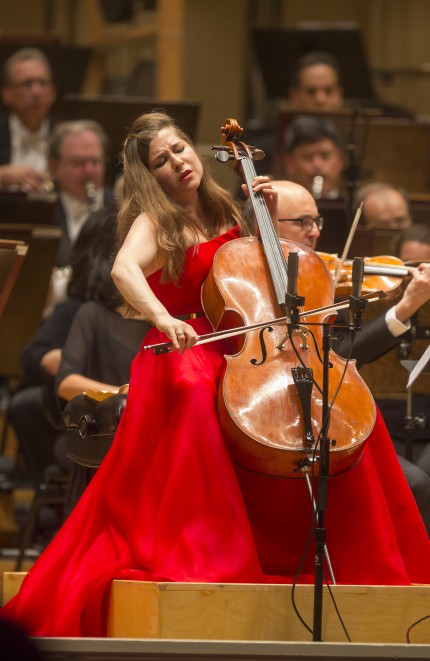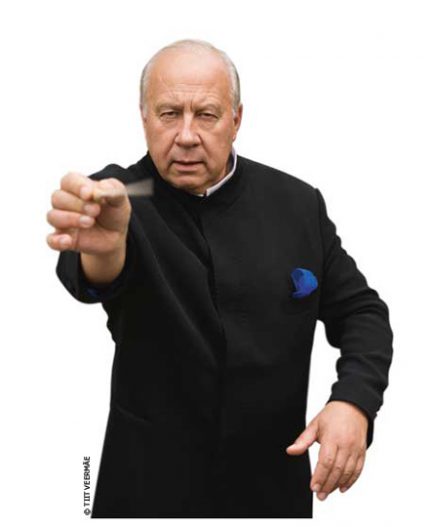Järvi, Weilerstein join forces for Czech and American rarities with CSO

It was a great loss to the music world when Jiří Bělohlávek passed away last May. More specifically, it was a loss for local audiences with the distinguished Czech conductor slated to make his belated Chicago Symphony Orchestra debut this season.
Fortunately, the ever-reliable Neeme Järvi was available to take the reins for Bělohlávek’s CSO program this week and the existing Czech-American program was in good hands.
Bohemian music framed the evening, which led off with music from Bedřich Smetana’s The Bartered Bride.
Järvi presented three excerpts from Smetana’s opera as a sort of mini-suite, artfully holding off the applause in between items with a simple raised hand. The 80-year-old Estonian conductor’s mobility isn’t what it once was, and he now carefully rations his stage entrances and exits.
Yet Järvi still manages to elicit notably vibrant and responsive playing by the orchestra, leading off with a fizzing account of the Bartered Bride Overture. The ensuing “Furiant” was just as scintillating, the conductor deftly pointing the accents of the insistent main theme. The “Dance of the Comedians” made a brilliant showpiece, the CSO strings vaulting through the whirling figurations at Järvi’s warp-speed tempo with complete accuracy and amusing nonchalance.
It’s wonderful that the CSO is doing more American repertoire this season–a sea-change from previous Riccardo Muti years–for which Cristina Rocca, the orchestra’s vice-president of artistic planning, deserves great credit.
That said, Samuel Barber’s Cello Concerto, the evening’s centerpiece, is not among the composer’s most timeless inspirations. The concerto hasn’t been scheduled by the CSO in 65 years, since its dedicatee Raya Garbousova last performed it with Rafael Kubelik in 1952.
In fact, the Cello Concerto is the weakest of Barber’s three works in the genre—not a patch on his Piano Concerto, much less the popular, indelible Violin Concerto (beautifully played by James Ehnes with the CSO in October).
Barber struggled with his Op. 22, revising it more than once and, unlike the natural melodic flow of the Violin Concerto, here the seams show. The inspiration is pallid throughout, lacking dramatic incident, crucial contrast and thematic memorability. Indeed, the score feels like a tired compendium of concerto box checking–virtuosic cadenzas, fast pizzicatos, lyrical moments and an emphatic finale all making timely appearances without the score ever adding up to more than its cookie-cutter parts.
Alisa Weilerstein is among our finest young cellists but even she–with the high-powered backing of Järvi and the CSO—couldn’t make a convincing case for this music. It was for no lack of trying, with Weilerstein wringing as much expressive feeling and poetry as possible out of the sweet-sad Andante and handling the considerable technical complexities with admirable gleam and facility. In her encore–seemingly obligatory after all concerto performances these days at Orchestra Hall–Weilerstein found more lilting charm and musical substance in three minutes of Bach (the Bourée from the Cello Suite No. 3) than in the preceding half-hour of the concerto.
The evening closed with Dvořák’s Symphony No. 5. It’s good to see that some of the less-often-heard symphonies of the Czech composer are coming out of the shadows. Järvi is one of the few living conductors to have recorded Dvořák’s complete symphonies and was clearly in his element.
If Thursday’s performance was less meticulous and cohesive than in the work’s last appearance, led by Riccardo Muti in 2012, Järvi’s bluff energy and no-fuss, lack of pretension proved enjoyable enough on its own merits, highlighted by deliciously characterful woodwind contributions throughout.
The program will be repeated 8 p.m. Friday and Saturday and 7:30 p.m. Tuesday. cso.org; 312-294-3000.
Posted in Performances




Posted Dec 09, 2017 at 8:49 am by Tod Verklärung
With respect to the “sea change” of American repertoire, I think it is pretty easy to over-praise the situation. Were it not for the Bernstein anniversary being celebrated by virtually every US orchestra, and setting aside the usual attention to composers-in-residence, there will be little American repertoire: two Barber Concertos, and one piece by each of the following: Higdon, Raimi, Walker, and the Lincoln Portrait, plus whatever film music John Williams brings with him.
If one wants to hear more unusual choices, one need only travel 90 miles north to Milwaukee. From Americians and others: Bernstein, Heggie, Ives, Muhly, Copland, John Adams, Rouse, Cooley, John Luther Adams, Perry, Barber, Ligeti, Jalbert, Augusta Read Thomas, Vaughan Williams, and Joan Tower.
Posted Dec 10, 2017 at 7:43 am by Laurie
Or, one could merely walk across the street to Millennium Park for the Grant Park Music Festival during the summer for more unusual repertoire choices.
Posted Dec 11, 2017 at 7:36 am by Andrew
Frankly, sometimes I wish that Grant Park Festival would stick to the warhorses, considering the amount of sonic competition (ambulances, helicopters, loud conversations over cheap bottles of wine) that exists in that environment. It would really be great to hear more unusual orchestral repertoire indoors in Chicago.